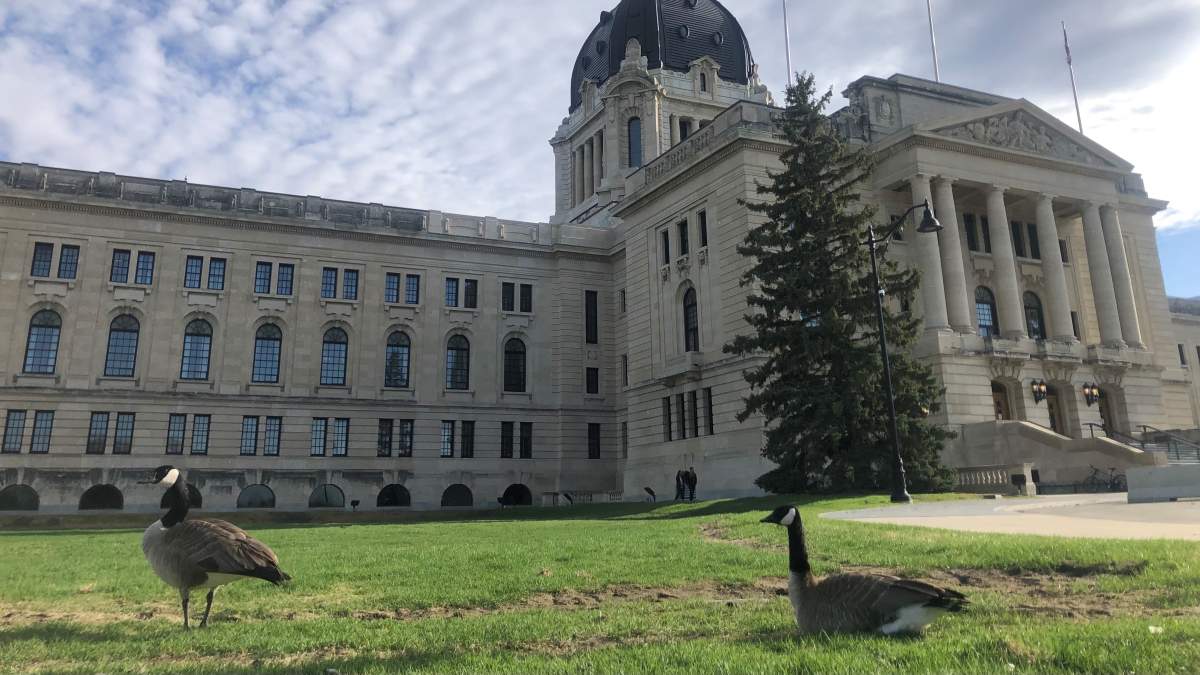The government of Saskatchewan says the contentious Bill 70 will be passed next week after hours of rigorous committee debate, paving the way for an increased security presence at the legislative building and surrounding grounds.

The bill will reduce the role of the sergeant-at-arms and create a new service to oversee security at the building and on the adjacent lawns.
It comes in response to “evolving security threats” to which Corrections, Policing and Public Safety Minister Christine Tell says the sergeant-at-arms isn’t properly equipped to respond.
“It is about the safety and security of all who use this building, who work here and who are outside on the grounds,” Tell told reporters Wednesday after a question period devoted almost entirely to the topic.
“There’s has been an increase in the intensity of the rhetoric articulating the threats or doing something to harm. All legislatures are revisiting the security issue. If they haven’t already they’re in the process of doing it because of this very thing.”
In Intergovernmental Affairs and Justice Committee debates this week, Tell cited a Canadian Security Intelligence Service report stating “the COVID-19 pandemic has exacerbated xenophobic and anti-authority narratives, many of which may directly or indirectly impact national security considerations”.
She said in committee that the new security service, which will be led by a ministry-appointed director, will better be able to collaborate with other provincial protective and law enforcement agencies.
- Queen’s University students stranded in Doha after Iran attack shuts down airspace
- Attack on Iran triggers global flight disruptions, impacts Canadian travellers
- Iran begins search for new leader; U.S. military says 3 service members killed
- Carney calls for protection of civilians as U.S., Israel strike Iran
These include Wascana Centre Community Safety Officers and highway patrollers, both of which were recently moved under the jurisdiction of a “single organizational structure” called the Provincial Protective Services Branch overseen by the Ministry of Corrections, Policing and Public Safety.

Get breaking National news
“Placing the responsibility for this within the ministry allows for the proposed unit to be more flexible in responding to these concerns, as resources and supports can be added as needed in a manner that is currently not possible,” Tell told the committee.
“Silos exist across government and we’re all aware of that, and it makes inter-ministry problem solving and co-operation a challenge.”
The committee also heard that the ministry of Corrections, Policing and Public Safety has access to “national-level intelligence networks” that the sergeant-at-arms does not.
The Saskatchewan NDP, though, continued to voice their concerns about the bill which they’ve criticized since it was first introduced last fall.
Opposition Deputy Leader Nicole Sarauer worried the appointed director could be influenced or directed by government.
“There are still way too many unanswered questions. There are still concerns about what this is going to mean for protests,” she said.
“There has been the odd government assurance that this isn’t what they’re intending but the truth of the matter is in the legislation, and it’s clear the director of legislative security will answer to the minister and government.”
Sarauer has said in the past that she believes concerns around safety and security at the legislature should have first been brought to the Board of Internal Economy where members form bothe government and opposition would be present.
She said the lack of opposition consultation has also led to concerns about surveillance and intelligence gathering possibly occurring inside of the building.
“The important issue here is trust,” she said.
“Ensuring that everybody can trust that what’s done in this building is protected and safe, that conversations are confidential and there is no sort of political shenanigans that are happening with any of that information.”
Meanwhile, Tell said the truck convoys that happened in Regina, Ottawa and elsewhere are examples of potential threats to public safety or law and order.
She said the response to the convoy that arrived in Regina in early February, which involved security checkpoints and barricades at the entrance points to the legislative grounds parking lot, was “orchestrated” by her ministry and serves as an example of the inter-agency collaboration she believes is needed to protect public safety.
“That was a one-off. We saw the success from it. It will be an example of how things are going to work in the future. It will happen ‘boom, boom, boom.'”
She insisted, though, that the new service will not prevent or influence the right to legal protests.
“That’s absolutely fear-mongering and that is not true,” she said, calling the future security service members “non-partisan civil servants”.
“Everybody has a right to protest. It’s just when they’re committing crimes or violating the law that isn’t a right.”
Tell did not provide a specific cost figure, nor a date for when the new security service will begin operating.
She estimated the service will consist of 11 members, all of whom will be armed.









Comments
Want to discuss? Please read our Commenting Policy first.